2018 MOMRI Annual Conference “Musicking, Human Rights & Inclusion”
Report by Olivier Urbain, MOMRI Director

This year our Annual Conference benefited from the outstanding experience of our two keynote speakers, Laura Hassler and Svanibor Pettan (see details below). One is a top activist, the other a first-class academic, and our meetings and discussions have reinforced MOMRI’s sense of mission: the creation of a space allowing various specialists to come together to advance the field of music in peacebuilding. The Annual Conference took place from Oct. 3 to 6, 2018, with a public symposium on Oct. 6 attended by over 100 individually invited guests. Strategic and thematic brainstorming sessions facilitated by the MOMRI Research Fellows and our two keynote speakers were held the other three days. Below please find a short bio of the two keynote speakers, and a summary of the symposium which included a live performance of koto and shakuhachi.
 Laura Hassler is the founder and director of Musicians Without Borders (MWB), a pioneer in applying the power of music to peacebuilding. Their motto is “War Divides, Music Connects.” Its programs span many music genres and styles, but all are organized around the concepts of equality, safety, inclusion, creativity and quality. In its grass-roots projects, trainings and advocacy, MWB seeks to empower musicians as activists, using the power of music to bridge divides, strengthen communities, and heal the wounds of war.
Laura Hassler is the founder and director of Musicians Without Borders (MWB), a pioneer in applying the power of music to peacebuilding. Their motto is “War Divides, Music Connects.” Its programs span many music genres and styles, but all are organized around the concepts of equality, safety, inclusion, creativity and quality. In its grass-roots projects, trainings and advocacy, MWB seeks to empower musicians as activists, using the power of music to bridge divides, strengthen communities, and heal the wounds of war.
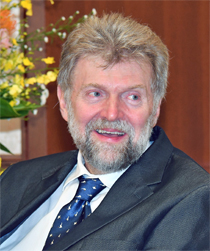 Svanibor Pettan is professor and chair of the ethnomusicology programme at the University of Ljubljana, Slovenia. His publications are on music, politics and war, multiculturalism, minorities, gender, and applied ethnomusicology. He recently published The Oxford Handbook of Applied Ethnomusicology, co-edited with Jeff Todd Titon. Past Secretary General and current Vice-president of the International Council for Traditional Music (ICTM), founder of its Study group on applied ethnomusicology and Chairperson of its Study group on music and minorities.
Svanibor Pettan is professor and chair of the ethnomusicology programme at the University of Ljubljana, Slovenia. His publications are on music, politics and war, multiculturalism, minorities, gender, and applied ethnomusicology. He recently published The Oxford Handbook of Applied Ethnomusicology, co-edited with Jeff Todd Titon. Past Secretary General and current Vice-president of the International Council for Traditional Music (ICTM), founder of its Study group on applied ethnomusicology and Chairperson of its Study group on music and minorities.
The Power of Music in Peacebuilding
By Laura Hassler, Founder & Director of Musicians Without Borders
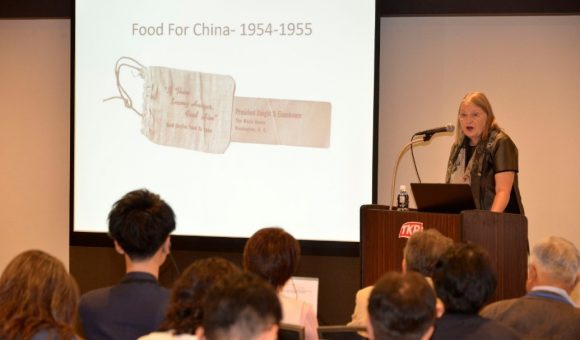
Together with a community of musicians, Laura Hassler founded Musicians Without Borders (MWB) in 1999, as a response to the challenge to be peacemakers in a world dominated by war. Today, it is one of the world’s pioneers in applying music as a tool for peacebuilding. MWB has long-term programs in Kosovo, Rwanda, Palestine, Northern Ireland and El Salvador, and with refugees in Europe.
Laura shared stories from her own life as a musician and peace activist and her personal experiences of music’s power to connect. She highlighted several of MWB’s key projects around the world. In the brainstorm sessions, Laura asked for MOMRI’s attention to the sometimes divergent agendas of those implementing music and peacebuilding programs, and those wanting to study and research this work.
The Music & Human Rights Exhibition Organized by MOMRI and the Min-On Museum
By Olivier Urbain, director of the Min-On Music Research Institute (MOMRI)
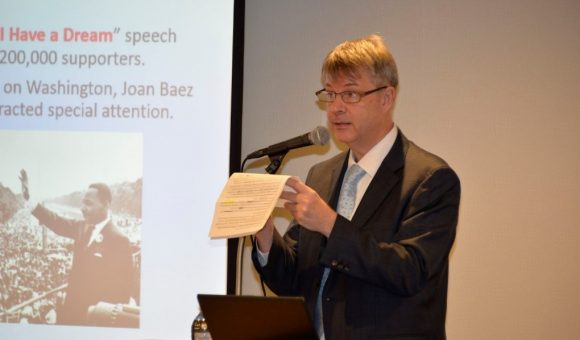
It was held this year to celebrate the 55th anniversary of Min-On and the 70th anniversary of the Universal Declaration of Human Rights. One section was devoted to a tour of the world (the Struggle for Human Rights in the US and South Africa, Censorship in Japan during the War, Nueva Canción in Latin America). The next section presented ideas connecting music and human rights, such as ambivalence, musicking, and activism. The last section introduced the work of MOMRI, with quotes from important thinkers on the topic of the exhibit.
Musicking and Inclusion in Venezuela
By Elaine Sandoval, MOMRI Associate Research Fellow, PhD Student, The Graduate Center, CUNY
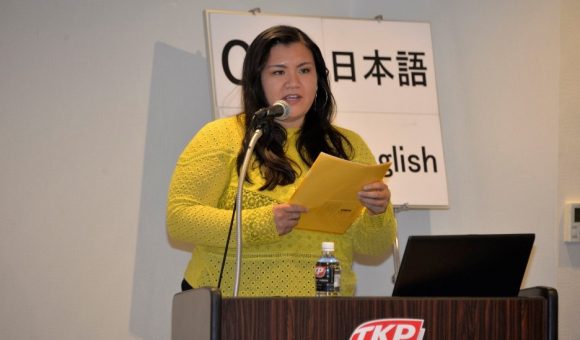
Since 2016, Ms. Sandoval has made two trips to Venezuela, where she has been researching música llanera, or traditional music from the interior plains region, specifically the inclusion of música llanera pedagogies into Venezuela’s national system of music education, El Sistema. Her research has been taking place within the context of a constantly intensifying economic, political, and social crisis that you may have come across in the international news. She focuses on the efforts to include música llanera in music education today.
Music Therapy and Participation in Socio-Cultural “Fictions”
By Craig Robertson, MOMRI Research Fellow, Head of Research at Nordoff Robbins
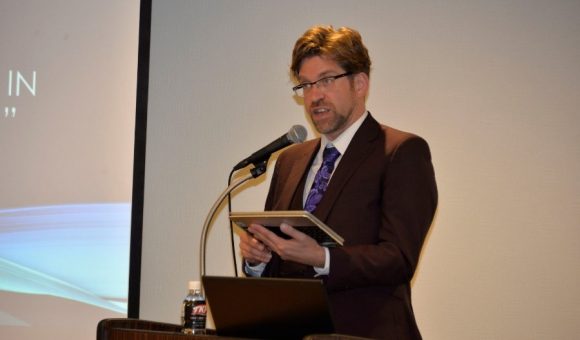
Historian Yuval Noah Harari has suggested that the human capacity to create and share meaning is actually a process of creating shared fictions, and that this ability to believe in shared fictions and cooperate in huge numbers is why human sapiens have thrived as a species. Music therapy is often seen as a method that can improve access and participation in this shared meaning-making space. Dr. Robertson discussed how music therapists often engage with people with disabilities through the shared fictions of the power of music and human rights.
Integrating Perspectives on Musicking, in Support of Peacebuilding, Human Rights and Inclusion
By Michael Golden, MOMRI Research Fellow, Professor at Soka University of America
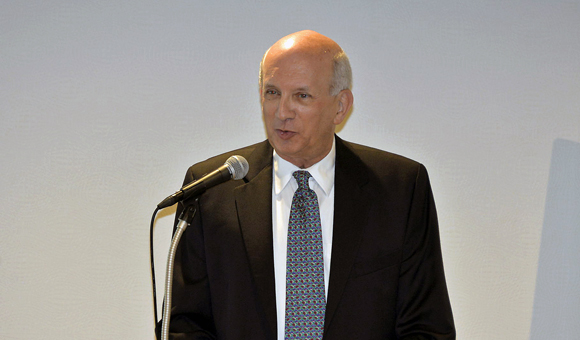
Ethnomusicological research from around the world shows that people feel that musicking fosters a sense of being connected to or part of something larger than themselves, supporting the common intuition that music should be able to contribute to peacebuilding. Because expanding identity into a larger environment can be understood as an essentially ecological process, Dr. Golden believes we can develop and improve musical activities aimed at protecting and advancing human rights by integrating perspectives from, for example, ecologists and neuroscientists, along with musicians and music researchers.
Applied Ethnomusicology for a Better World:
Collaborative Empowerment of the Underprivileged through Music
by Svanibor Pettan, Professor, University of Ljubljana, Slovenia.
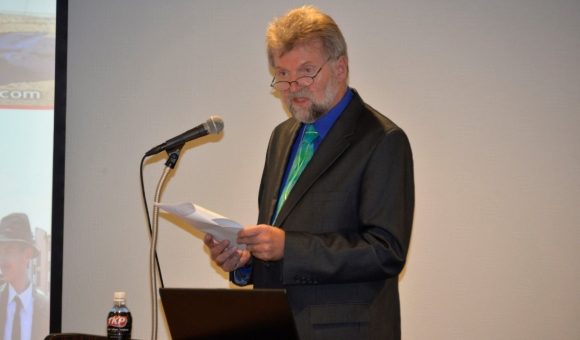
This presentation traces the development of applied ethnomusicology and shows how it became one of the principal trends in the contemporary “study of people making music.” It demonstrates how the use of ethnomusicological understanding and skills beyond the typical academic aims of deepening and broadening knowledge can and does benefit the real-life conditions of people.
Dr. Pettan focused on a few cases in which ethnomusicologists join forces in a collaborative and organized manner with various underprivileged communities worldwide. He showed how they offer support (for instance through action, adjustment or administrative work), or advocate strategies to make a difference at the societal level. Musicking and inclusion are always parts of a bigger picture, while human rights are sometimes considered in relation to cultural rights. This presentation was also a personal story about ethics, values, and challenges, of an applied ethnomusicologist in the fast-changing and troubled world of today.
Performance by the KS Duo
By Miyama McQueen Tokita (Koto) and Bruce Huebner (Shakuhachi)
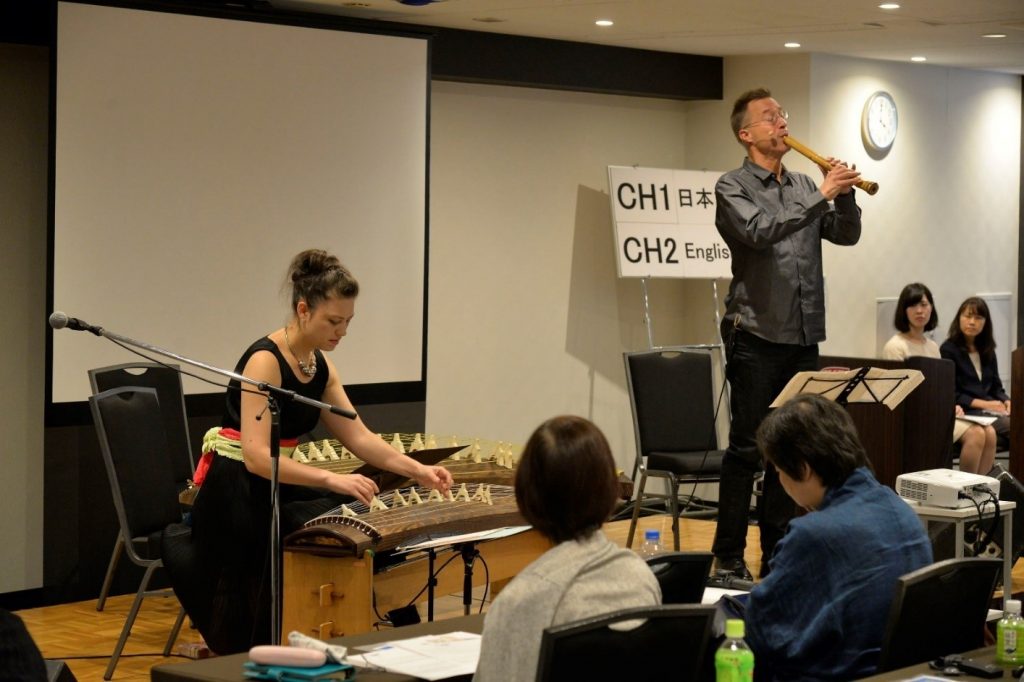
The current author not being trained as a music critic, I will simply say that it was a fabulous performance, authentic, original, traditional and futuristic all at the same time. I highly recommend visiting their websites, and enjoying a few soundbites below:
https://www.miyamamcqueentokita.com/
https://www.shakuhachibruce.net/
https://soundcloud.com/ks-duo
Meet & Greet

This year we tried something new, and we invited the speakers, performers, organizers and members of the audience to get together and continue the discussions at a Meet & Greet. Many new connections were made and original insights generated, encouraging us to include this event from now on.
Towards our Fifth Anniversary

Another first we tried this year was to involve members of the audience and MOMRI supporters ahead of the conference, through online communication and a few onsite study meetings. We would like to continue this participative and interactive approach towards our fifth anniversary conference which will be held in the fall of 2019.
There are many ways to get involved (you can choose fun, light, serious, academic, hands-on or other ways!) and we hope to work with you from now on towards our first large-scale celebration (our plan will only be revealed to those who participate actively!).
With many thanks for your continued support of MOMRI’s activities.
For more information about our Fifth Anniversary, contact the author at <o.urbain@min-on.org>
Some more pics of our Meet & Greet…











